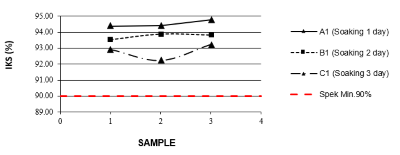The Influence of Immertion on Marshall Parameters and Residual Strength Index of Rubber Asphalt Mixture
DOI:
https://doi.org/10.24036/cived.v11i1.542Keywords:
Rubber Asphalt, Immersion, Marshall Parameters, Residual Strength IndexAbstract
The bad drainage system in the road pavement area also causes the road body to be submerged in water for quite a long time, causing the bond between the asphalt and aggregate to loosen, resulting in decreased service life. Developments in the field of road construction have now implemented many innovative ideas, one of which is namely the use of rubber asphalt with asphalt containing natural rubber which has 1.5 to 2 times the strength compared to conventional asphalt. In evaluating the performance of an asphalt mixture, especially the AC-WC Wear layer mixture, it can be analyzed using the Marshall test method by taking into account the conditions being tested, namely the test object being immersion in water or continuously flooded with water. The method used in this research is an experiment with treatment conditions for AC-WC rubber asphalt mixture specimens which are continuously immersion in water for 1 day, 2 days and 3 days. The research results showed that there was an increase in the VMA, VIM, and flow parameters, while the VFB, stability, and Residual Strength Index parameters decreased with increasing soaking time. Based on the research results, it can be concluded that although there is an influence on the performance of the asphalt mixture with the use of rubber asphalt, the decrease that occurs is not too large and is still within the required specifications.
Downloads
References
Sunarjono, S., Hidayati, N., & Pratama, A. I. (2020). Resistance of AC-WC Mixtures Using Latex to Water. Journal of Transportation, 20(2), Article 2. https://doi.org/10.26593/jtrans. v20i2.4105.125-136
Susanto, I., & Suaryana, N. (2019). Performance Evaluation of Worn Coated Asphalt Mixture (AC-WC) with Plastic Waste Added Material. Journal of Civil Engineering Applications, 17(2), 27. https://doi.org/10.12962/j2579-891X.v17i2.4980
Ramadhan, D. M., Indriani, A., & Utomo, G. (2023). Analysis of the Characteristics of Using PG 76 Polymer Asphalt on the Marshall Durability of Asphalt Concrete Layers - Wearing Course. 17th Context Balikpapan, 1.
Setyoko, A. T., & Lukiawan, R. (2019). Development of Standardization of Natural Rubber as Raw Material for Rubber Asphalt and Rubber Asphalt Products. Standardization Scientific Meeting and Presentation, 2019, 13–22. https://doi.org/10.31153/ppis. 2019.2
Prastanto, H., Firdaus, Y., Puspitasari, S., Ramadhan, A., & Falaah, A. F. (2018). Properties of Natural Rubber Modified Asphalt in Various Types and Doses of Natural Rubber Latex. Rubber Research Journal, 65–76. https://doi.org/10.22302/ppk.jpk.v36i1.444
Ministry of Public Works and Public Housing. (2019). Ministerial Decree of PUPR Number 04/SE/M/2019 Design and Implementation of Hot Mix Asphalt with Asphalt containing Natural Rubber. Jakarta: Directorate General of Highways.
Amirudin, Indriani, A., & Utomo, G. (2023). Effect Of Soaking Cycle On Marshall Parameters And Durability Of AC-WCNR Rubber Asphalt Mixtures. Journal of Construction Engineering, 2(2), Article 2. https://jrk.politala.ac.id/index.php/JRK/ article/view/15
SKh-1.6. 25, Laston Interim Special Specifications with Asphalt Containing Natural Rubber, 2018, Ministry of Public Works and Public Housing.
Sunarjono, S., Hidayati, N., Magfirona, A., & Prakoso, A. D. (2021). Investigation of the immersion resistance of the HRS-WC mixtures with applying static loading. Journal of Physics: Conference Series, 1858(1), 012023. https://doi.org/10.1088/1742-6596/1858/1/012023
Sunarjono, S., Anto, B. H., Hidayati, N., & Harnaeni, S. R. (2021). Durability of Asphalt Mixture AC-WC Using Latex Based on the Test Method of SNI 6753:2015. Urecol Journal. Part E: Engineering, 1(2), Article 2. https://doi.org/10.53017/uje.105
Wirahaji, I. B., & Wardani, A. M. C. (2019). The Effect of Rainwater on the Marshall Characteristics of Hot Asphalt Mixes on Road Surfaces. Widya Teknik, 13(02), Article 02. https://doi.org/10.32795/ widyateknik.v13i02.510
Kabo, D. R. G. 1, Tumpu, M. 2, & Parung, H. 3 1 L. (2021). Influence of Water Immersion on Stability of AC-WC Mixed with Gondorukem Additional Material. IOP Publishing, 921, 012067. https://doi.org/10.1088/1755-1315/921/1/012067
Linus, J. S. (2022). The Effect of Varying Soaking Time on the Properties and Characteristics of Asphalt Mixtures with the Addition of Styrofoam [Thesis, Bosowa University]. http://localhost:8080/xmlui/handle/123456789/2598
Arifin, M., & Tugiman. (2022). Analysis of the Effect of AC-BC Pavement Soaking Time on Asphalt Stability and Flow. STATICS: Journal of Civil Engineering, 8(2), Article 2.
Damopolii, A. T. A., Faisal, F., Arifin, W., Massara, A., & Salim, S. (2019). Analysis of the Effect of Soaking on Durability and Indirect Tensile Strength of Asphalt Concrete Mixtures. Civil Engineering Student Scientific Journal, 324–331.
Nahyo, N., Sudarno, S., & Setiadji, B. H. (2015). Durability of Hot Rolled Sheet-Wearing Course (HRS-WC) Mixture Due to Continuous and Periodic Soaking in Water. Unaya

Downloads
Published
How to Cite
Issue
Section
License
Copyright (c) 2024 Andi Marini Indriani, Gunaedy Utomo, Amirudin Amirudin

This work is licensed under a Creative Commons Attribution 4.0 International License.







2.jpg)
